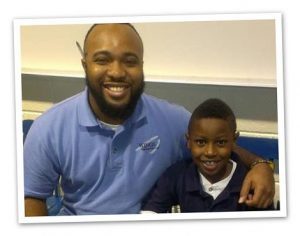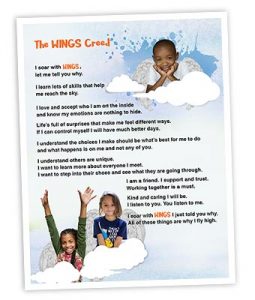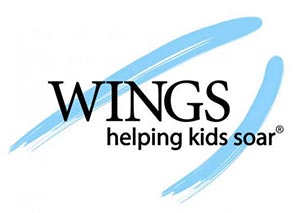Sign up for our monthly Leap Update newsletter and announcements from the Leap Ambassadors Community:
By clicking "Stay Connected" you agree to the Privacy Policy
By clicking "Stay Connected" you agree to the Privacy Policy
Wings for Kids
The story of how Cheryl Hollis coached a WINGS leader to succeed shows what disciplined people-focused management looks like—and the dramatic difference it can make. It’s part of WINGS for kids’ secret sauce.

When children feel more connected to school, they’re more likely to attend, work hard, do well, and remain in school. For children at high risk of school failure, school connectedness can be the difference between getting along with others and repeated suspensions, attending school regularly and being chronically truant, and ultimately, graduating high school and dropping out.
What, then, drives school connectedness? WINGS for kids—which has delivered stunningly positive results—has found that it’s all about strong social and emotional skills: self-awareness, self-management, responsible decision making, social awareness, and relationship skills.
The first cohort of WINGS kids graduated at a remarkable 40% higher rate than comparable students. In fact, WINGS kids are three times less likely to be chronically absent from school and less than half as likely to have disciplinary referrals.
But, without highly competent staff in place, none of this is possible.
At WINGS for kids, social and emotional learning is baked into three hours of daily programming. WINGS leaders—college-age after-school teachers—lead activities ranging from teaching a social and emotional learning curriculum to fun electives, quality homework time, and community service around the school. They are required to model the skills they teach in everything they do, identify teachable moments, and provide one-on-one, supportive coaching to students—the WINGS way—every time.
My coaching included helping Juan set small goals, so he could achieve small successes and reflect on progress at the end of each day.
—Cheryl Hollis
Regional Operations Director of the Carolinas
WINGS for kids
WINGS programming, in other words, is as good as the WINGS leaders delivering it.
So WINGS managers practice disciplined people-focused management. First, they hire the most competent college students. Second, everyone goes through extensive training on the WINGS model. Third, managers provide intentional on-the-job coaching, because the organization recognizes that implementing lessons from training requires practice and support for continuous improvement.
Cheryl Hollis, regional operations director of the Carolinas, shared the example of WINGS Leader Juan, who needed to improve in four out of five skills. He argued with the kids, let situations outside of his control bring down his energy, and reacted defensively to feedback. “For Juan to be successful, I needed to evoke change in him,” she said.

Cheryl started by helping him become aware of his own behavior. She identified a child who shared many of Juan’s characteristics. They talked about the child and their interactions. Seeing himself in the child helped Juan acknowledge both the positive and negative behaviors they had in common.
Cheryl provided continuous feedback, positive and corrective, every day-on the spot and in informal conversations. “My coaching included helping Juan set small goals, so he could achieve small successes and reflect on progress at the end of each day,” said Cheryl. “I wanted him to get into the habit of goal-setting and learn to look back at his accomplishments.” Juan also received feedback in more formal ways, through frequent competency assessments and monthly evaluations.
Soon, Juan started to receive more “Caught in the Act” (CIA) cards, which detailed how he had displayed a skill well. When WINGS staff receive five CIA cards, they get incentives like a gift card or a “leave-two-hours-early” pass.
Over the course of a few months, Juan began modeling all five skills. It helped his students, too. The children were learning the WINGS “Creed” (the kid-version of the social and emotional skills being taught) by heart, and they were increasingly able to cite examples of how they had made use of each of the skills. Juan completed the school year successfully, stayed for another year, and was then promoted to a position as team lead of other WINGS leaders for another two years.
Juan isn’t an isolated example. Cheryl and other managers coach all WINGS leaders to become effective instructors, because staff competencies translate into child outcomes—and teaching children the skills they need to succeed in life is priority number one.

Do you want to implement disciplined, people-focused management like WINGS for kids? Check out pillar #2 in the Performance Imperative and Performance Practice (formerly PIOSA).
Last Updated: September 26, 2018

Wings for Kids
Locations: Charleston, SC; Charlotte, NC; Atlanta, GA
Field: Out-of-school time social and emotional learning
Budget: <$10 million
This document, developed collaboratively by the Leap of Reason Ambassadors Community (LAC), is licensed under a Creative Commons Attribution-NoDerivatives 4.0 International License. We encourage and grant permission for the distribution and reproduction of copies of this material in its entirety (with original attribution). Please refer to the Creative Commons link for license terms for unmodified use of LAC documents.
Because we recognize, however that certain situations call for modified uses (adaptations or derivatives), we offer permissions beyond the scope of this license (the “CC Plus Permissions”). The CC Plus Permissions are defined as follows:
You may adapt or make derivatives (e.g., remixes, excerpts, or translations) of this document, so long as they do not, in the reasonable discretion of the Leap of Reason Ambassadors Community, alter or misconstrue the document’s meaning or intent. The adapted or derivative work is to be licensed under a Creative Commons Attribution-NoDerivatives 4.0 International License, conveyed at no cost (or the cost of reproduction,) and used in a manner consistent with the purpose of the Leap of Reason Ambassadors Community, with the integrity and quality of the original material to be maintained, and its use to not adversely reflect on the reputation of the Leap of Reason Ambassadors Community.
Attribution is to be in the following formats:
“From ‘Performance in Action: Wings For Kids, “When WINGS Leaders Fly High, So Do Children”,’ developed collaboratively by the Leap of Reason Ambassadors Community, licensed under CC BY ND https://creativecommons.org/licenses/by-nd/4.0/. For more information or to view the original product, visit https://leapambassadors.org/performance-articles/when-wings-leaders-fly-high-so-do-children/.”
The above is consistent with Creative Commons License restrictions that require “appropriate credit” be required and the “name of the creator and attribution parties, a copyright notice, a license notice, a disclaimer notice and a link to the original material” be included.
The Leap of Reason Ambassadors Community may revoke the additional permissions described above at any time. For questions about copyright issues or special requests for use beyond the scope of this license, please email us at info@leapambassadors.org.
We use cookies for a number of reasons, such as keeping our site reliable and secure, personalising content and providing social media features and to analyse how our site is used.
Accept & Continue